Analyzing Tourism Sustainability Amidst Environmental Concerns
VerifiedAdded on 2023/06/08
|11
|2830
|491
Report
AI Summary
This report explores the sustainability of tourism in the developing world, addressing the statement that given environmental concerns, tourism is unsustainable. It begins by defining sustainable development and sustainable tourism, highlighting the economic benefits and potential resource exhaustion in host nations. The report identifies key challenges such as greenhouse gas emissions, water consumption, waste management, loss of biodiversity, and the effective management of cultural heritage. It also considers changing consumer patterns and the increasing demand for eco-tourism. The report concludes by emphasizing the need for the tourism industry to address these challenges through green initiatives and sustainable practices to ensure long-term viability and minimize environmental impact. Desklib provides a platform for students to access similar solved assignments and past papers for further research.
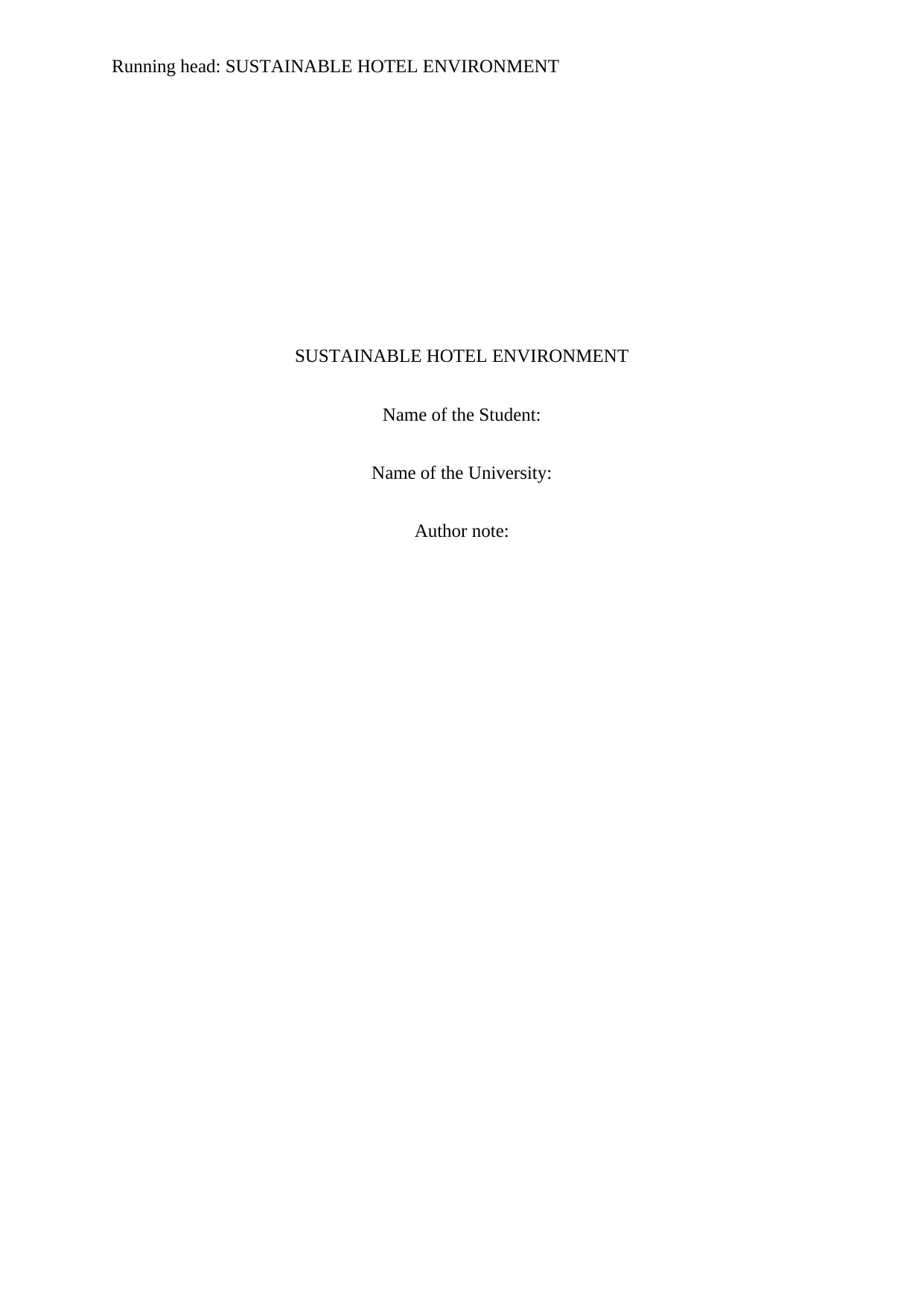
Running head: SUSTAINABLE HOTEL ENVIRONMENT
SUSTAINABLE HOTEL ENVIRONMENT
Name of the Student:
Name of the University:
Author note:
SUSTAINABLE HOTEL ENVIRONMENT
Name of the Student:
Name of the University:
Author note:
Paraphrase This Document
Need a fresh take? Get an instant paraphrase of this document with our AI Paraphraser
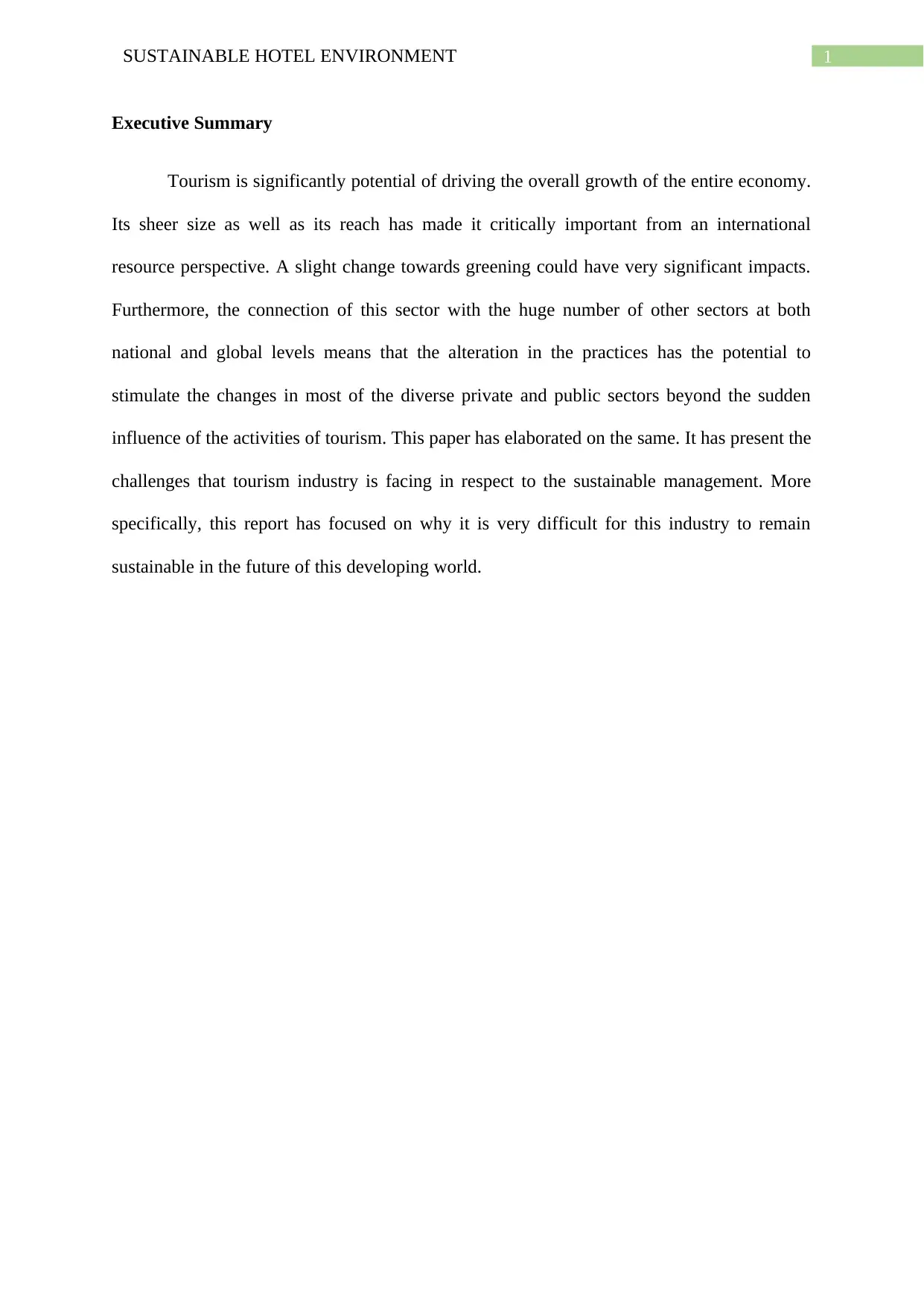
1SUSTAINABLE HOTEL ENVIRONMENT
Executive Summary
Tourism is significantly potential of driving the overall growth of the entire economy.
Its sheer size as well as its reach has made it critically important from an international
resource perspective. A slight change towards greening could have very significant impacts.
Furthermore, the connection of this sector with the huge number of other sectors at both
national and global levels means that the alteration in the practices has the potential to
stimulate the changes in most of the diverse private and public sectors beyond the sudden
influence of the activities of tourism. This paper has elaborated on the same. It has present the
challenges that tourism industry is facing in respect to the sustainable management. More
specifically, this report has focused on why it is very difficult for this industry to remain
sustainable in the future of this developing world.
Executive Summary
Tourism is significantly potential of driving the overall growth of the entire economy.
Its sheer size as well as its reach has made it critically important from an international
resource perspective. A slight change towards greening could have very significant impacts.
Furthermore, the connection of this sector with the huge number of other sectors at both
national and global levels means that the alteration in the practices has the potential to
stimulate the changes in most of the diverse private and public sectors beyond the sudden
influence of the activities of tourism. This paper has elaborated on the same. It has present the
challenges that tourism industry is facing in respect to the sustainable management. More
specifically, this report has focused on why it is very difficult for this industry to remain
sustainable in the future of this developing world.
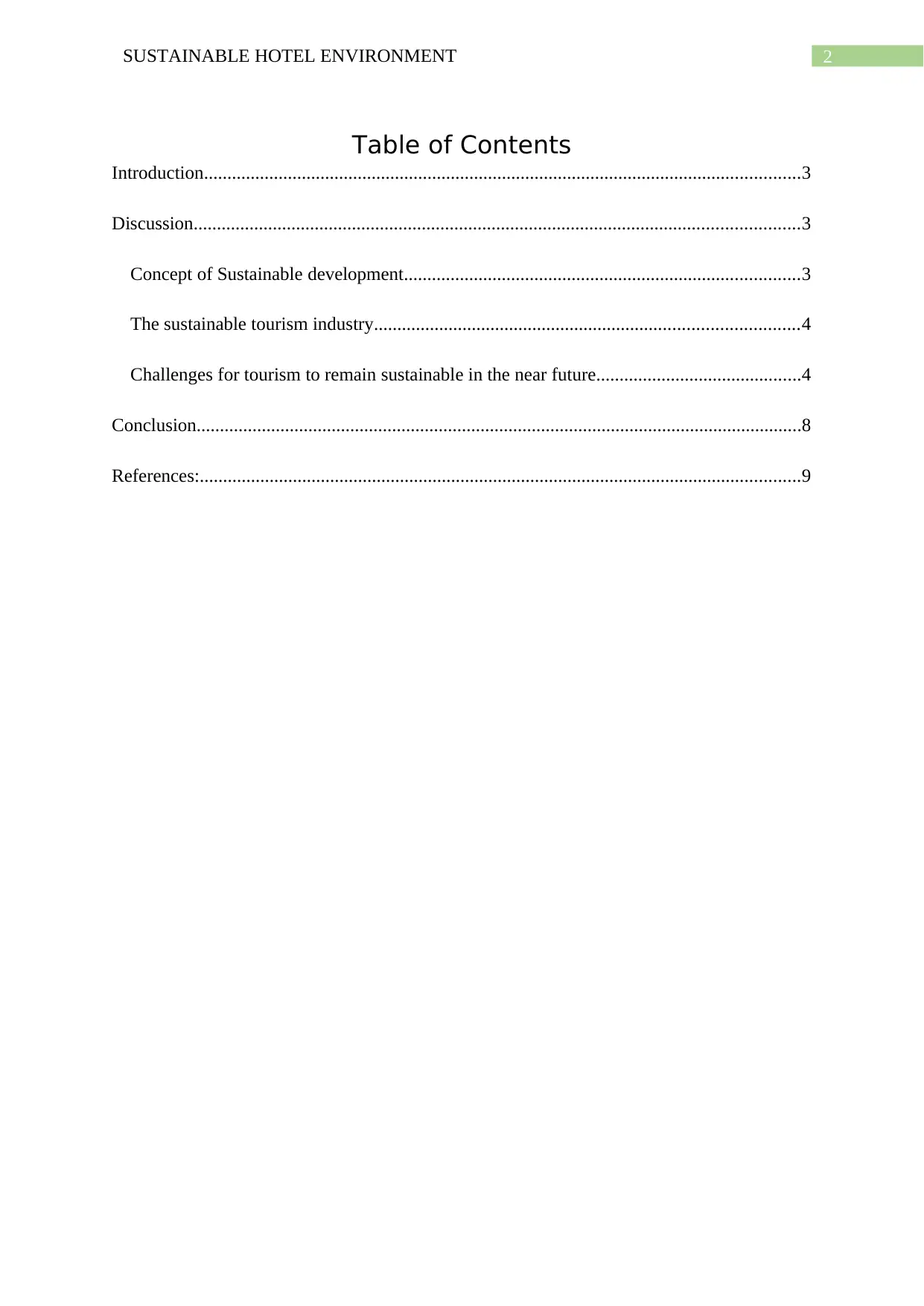
2SUSTAINABLE HOTEL ENVIRONMENT
Table of Contents
Introduction................................................................................................................................3
Discussion..................................................................................................................................3
Concept of Sustainable development.....................................................................................3
The sustainable tourism industry...........................................................................................4
Challenges for tourism to remain sustainable in the near future............................................4
Conclusion..................................................................................................................................8
References:.................................................................................................................................9
Table of Contents
Introduction................................................................................................................................3
Discussion..................................................................................................................................3
Concept of Sustainable development.....................................................................................3
The sustainable tourism industry...........................................................................................4
Challenges for tourism to remain sustainable in the near future............................................4
Conclusion..................................................................................................................................8
References:.................................................................................................................................9
⊘ This is a preview!⊘
Do you want full access?
Subscribe today to unlock all pages.

Trusted by 1+ million students worldwide
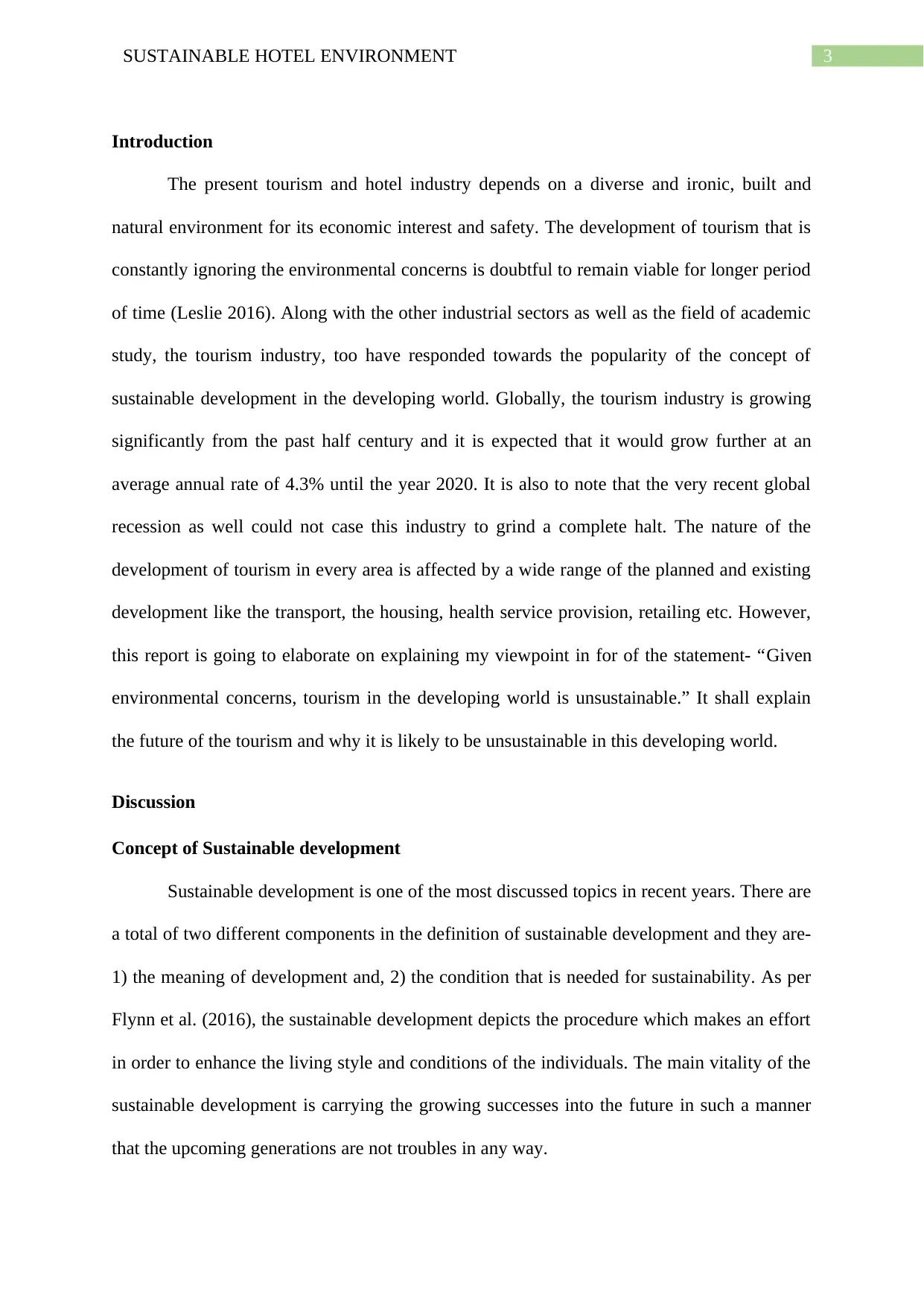
3SUSTAINABLE HOTEL ENVIRONMENT
Introduction
The present tourism and hotel industry depends on a diverse and ironic, built and
natural environment for its economic interest and safety. The development of tourism that is
constantly ignoring the environmental concerns is doubtful to remain viable for longer period
of time (Leslie 2016). Along with the other industrial sectors as well as the field of academic
study, the tourism industry, too have responded towards the popularity of the concept of
sustainable development in the developing world. Globally, the tourism industry is growing
significantly from the past half century and it is expected that it would grow further at an
average annual rate of 4.3% until the year 2020. It is also to note that the very recent global
recession as well could not case this industry to grind a complete halt. The nature of the
development of tourism in every area is affected by a wide range of the planned and existing
development like the transport, the housing, health service provision, retailing etc. However,
this report is going to elaborate on explaining my viewpoint in for of the statement- “Given
environmental concerns, tourism in the developing world is unsustainable.” It shall explain
the future of the tourism and why it is likely to be unsustainable in this developing world.
Discussion
Concept of Sustainable development
Sustainable development is one of the most discussed topics in recent years. There are
a total of two different components in the definition of sustainable development and they are-
1) the meaning of development and, 2) the condition that is needed for sustainability. As per
Flynn et al. (2016), the sustainable development depicts the procedure which makes an effort
in order to enhance the living style and conditions of the individuals. The main vitality of the
sustainable development is carrying the growing successes into the future in such a manner
that the upcoming generations are not troubles in any way.
Introduction
The present tourism and hotel industry depends on a diverse and ironic, built and
natural environment for its economic interest and safety. The development of tourism that is
constantly ignoring the environmental concerns is doubtful to remain viable for longer period
of time (Leslie 2016). Along with the other industrial sectors as well as the field of academic
study, the tourism industry, too have responded towards the popularity of the concept of
sustainable development in the developing world. Globally, the tourism industry is growing
significantly from the past half century and it is expected that it would grow further at an
average annual rate of 4.3% until the year 2020. It is also to note that the very recent global
recession as well could not case this industry to grind a complete halt. The nature of the
development of tourism in every area is affected by a wide range of the planned and existing
development like the transport, the housing, health service provision, retailing etc. However,
this report is going to elaborate on explaining my viewpoint in for of the statement- “Given
environmental concerns, tourism in the developing world is unsustainable.” It shall explain
the future of the tourism and why it is likely to be unsustainable in this developing world.
Discussion
Concept of Sustainable development
Sustainable development is one of the most discussed topics in recent years. There are
a total of two different components in the definition of sustainable development and they are-
1) the meaning of development and, 2) the condition that is needed for sustainability. As per
Flynn et al. (2016), the sustainable development depicts the procedure which makes an effort
in order to enhance the living style and conditions of the individuals. The main vitality of the
sustainable development is carrying the growing successes into the future in such a manner
that the upcoming generations are not troubles in any way.
Paraphrase This Document
Need a fresh take? Get an instant paraphrase of this document with our AI Paraphraser
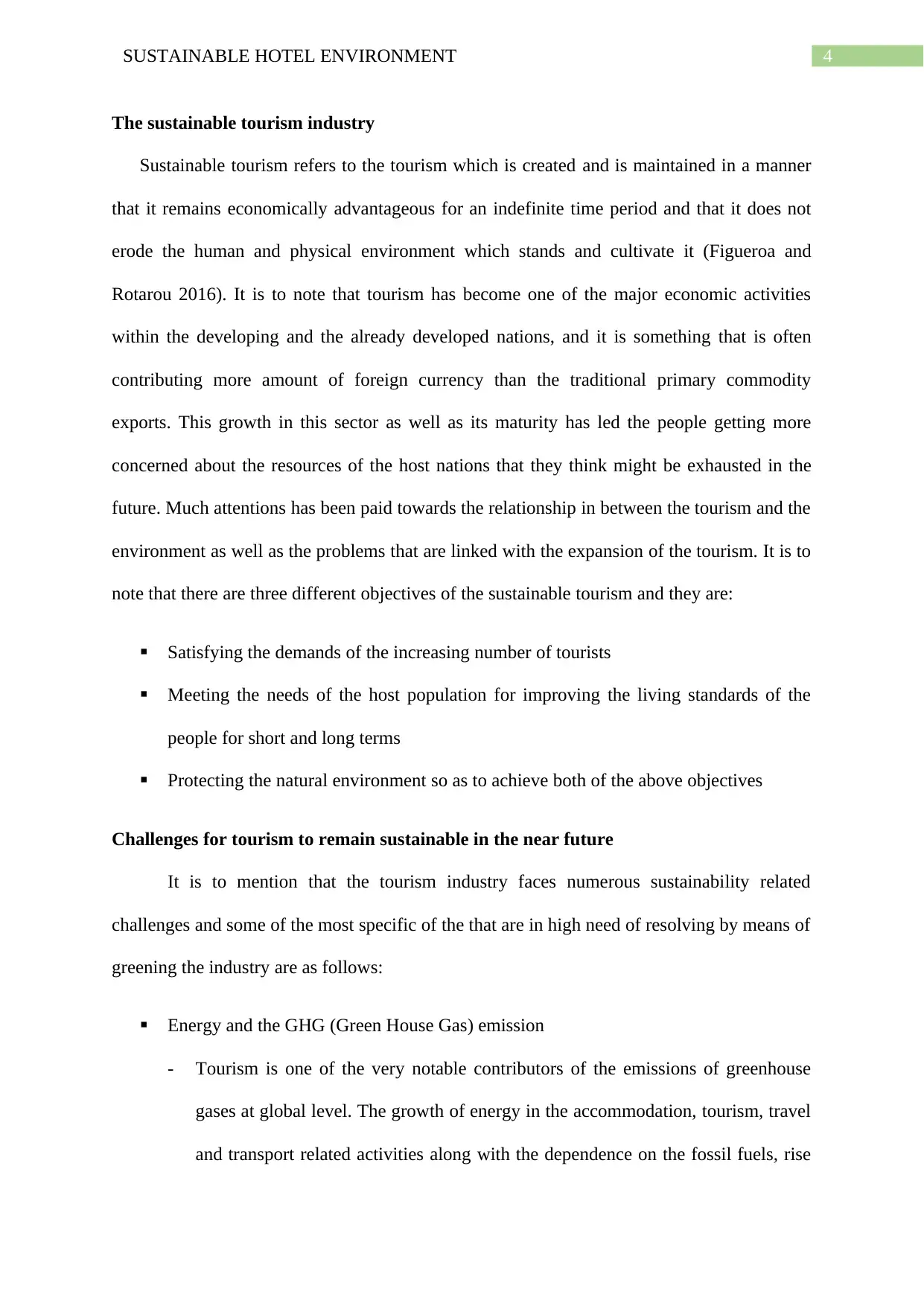
4SUSTAINABLE HOTEL ENVIRONMENT
The sustainable tourism industry
Sustainable tourism refers to the tourism which is created and is maintained in a manner
that it remains economically advantageous for an indefinite time period and that it does not
erode the human and physical environment which stands and cultivate it (Figueroa and
Rotarou 2016). It is to note that tourism has become one of the major economic activities
within the developing and the already developed nations, and it is something that is often
contributing more amount of foreign currency than the traditional primary commodity
exports. This growth in this sector as well as its maturity has led the people getting more
concerned about the resources of the host nations that they think might be exhausted in the
future. Much attentions has been paid towards the relationship in between the tourism and the
environment as well as the problems that are linked with the expansion of the tourism. It is to
note that there are three different objectives of the sustainable tourism and they are:
Satisfying the demands of the increasing number of tourists
Meeting the needs of the host population for improving the living standards of the
people for short and long terms
Protecting the natural environment so as to achieve both of the above objectives
Challenges for tourism to remain sustainable in the near future
It is to mention that the tourism industry faces numerous sustainability related
challenges and some of the most specific of the that are in high need of resolving by means of
greening the industry are as follows:
Energy and the GHG (Green House Gas) emission
- Tourism is one of the very notable contributors of the emissions of greenhouse
gases at global level. The growth of energy in the accommodation, tourism, travel
and transport related activities along with the dependence on the fossil fuels, rise
The sustainable tourism industry
Sustainable tourism refers to the tourism which is created and is maintained in a manner
that it remains economically advantageous for an indefinite time period and that it does not
erode the human and physical environment which stands and cultivate it (Figueroa and
Rotarou 2016). It is to note that tourism has become one of the major economic activities
within the developing and the already developed nations, and it is something that is often
contributing more amount of foreign currency than the traditional primary commodity
exports. This growth in this sector as well as its maturity has led the people getting more
concerned about the resources of the host nations that they think might be exhausted in the
future. Much attentions has been paid towards the relationship in between the tourism and the
environment as well as the problems that are linked with the expansion of the tourism. It is to
note that there are three different objectives of the sustainable tourism and they are:
Satisfying the demands of the increasing number of tourists
Meeting the needs of the host population for improving the living standards of the
people for short and long terms
Protecting the natural environment so as to achieve both of the above objectives
Challenges for tourism to remain sustainable in the near future
It is to mention that the tourism industry faces numerous sustainability related
challenges and some of the most specific of the that are in high need of resolving by means of
greening the industry are as follows:
Energy and the GHG (Green House Gas) emission
- Tourism is one of the very notable contributors of the emissions of greenhouse
gases at global level. The growth of energy in the accommodation, tourism, travel
and transport related activities along with the dependence on the fossil fuels, rise
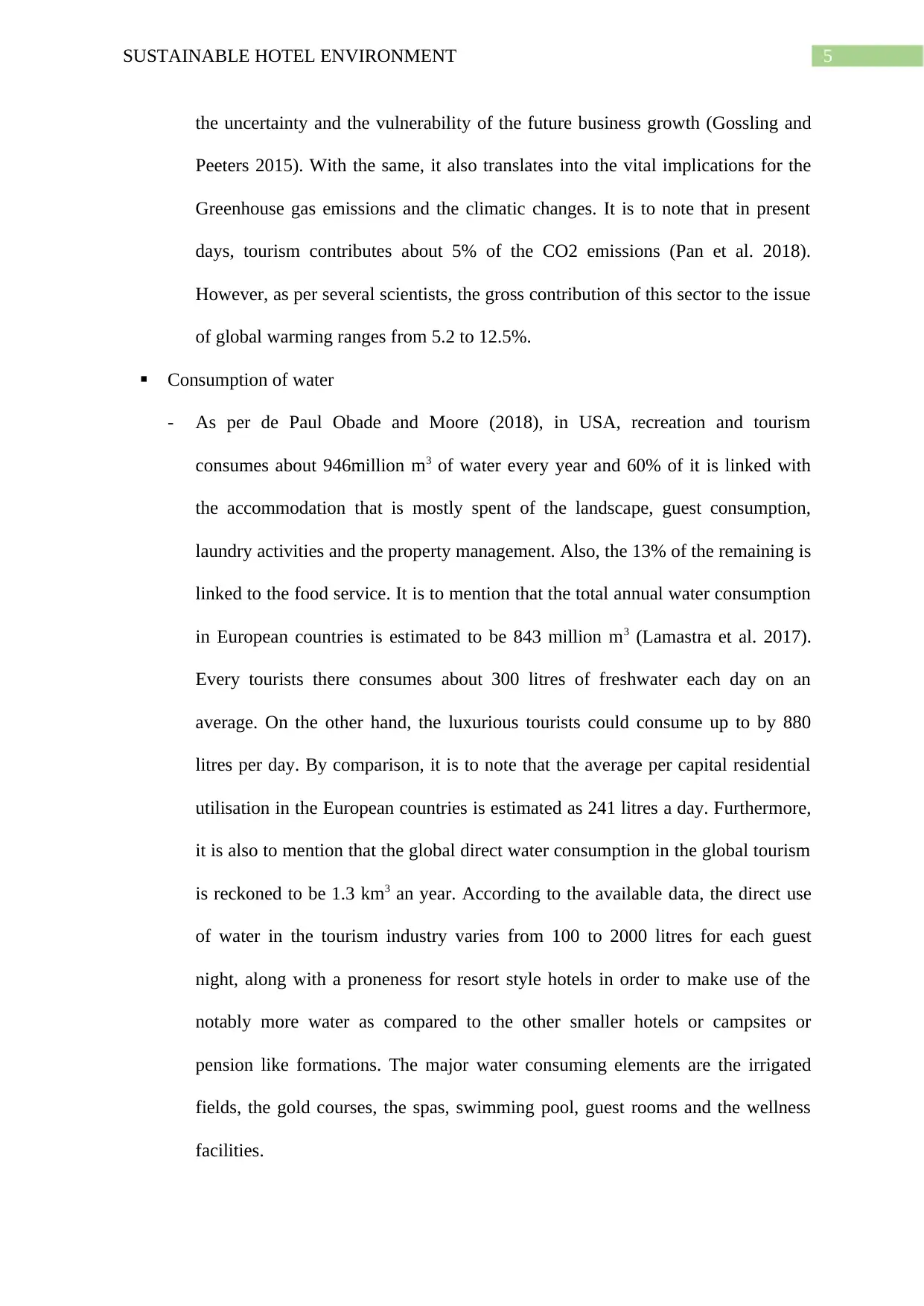
5SUSTAINABLE HOTEL ENVIRONMENT
the uncertainty and the vulnerability of the future business growth (Gossling and
Peeters 2015). With the same, it also translates into the vital implications for the
Greenhouse gas emissions and the climatic changes. It is to note that in present
days, tourism contributes about 5% of the CO2 emissions (Pan et al. 2018).
However, as per several scientists, the gross contribution of this sector to the issue
of global warming ranges from 5.2 to 12.5%.
Consumption of water
- As per de Paul Obade and Moore (2018), in USA, recreation and tourism
consumes about 946million m3 of water every year and 60% of it is linked with
the accommodation that is mostly spent of the landscape, guest consumption,
laundry activities and the property management. Also, the 13% of the remaining is
linked to the food service. It is to mention that the total annual water consumption
in European countries is estimated to be 843 million m3 (Lamastra et al. 2017).
Every tourists there consumes about 300 litres of freshwater each day on an
average. On the other hand, the luxurious tourists could consume up to by 880
litres per day. By comparison, it is to note that the average per capital residential
utilisation in the European countries is estimated as 241 litres a day. Furthermore,
it is also to mention that the global direct water consumption in the global tourism
is reckoned to be 1.3 km3 an year. According to the available data, the direct use
of water in the tourism industry varies from 100 to 2000 litres for each guest
night, along with a proneness for resort style hotels in order to make use of the
notably more water as compared to the other smaller hotels or campsites or
pension like formations. The major water consuming elements are the irrigated
fields, the gold courses, the spas, swimming pool, guest rooms and the wellness
facilities.
the uncertainty and the vulnerability of the future business growth (Gossling and
Peeters 2015). With the same, it also translates into the vital implications for the
Greenhouse gas emissions and the climatic changes. It is to note that in present
days, tourism contributes about 5% of the CO2 emissions (Pan et al. 2018).
However, as per several scientists, the gross contribution of this sector to the issue
of global warming ranges from 5.2 to 12.5%.
Consumption of water
- As per de Paul Obade and Moore (2018), in USA, recreation and tourism
consumes about 946million m3 of water every year and 60% of it is linked with
the accommodation that is mostly spent of the landscape, guest consumption,
laundry activities and the property management. Also, the 13% of the remaining is
linked to the food service. It is to mention that the total annual water consumption
in European countries is estimated to be 843 million m3 (Lamastra et al. 2017).
Every tourists there consumes about 300 litres of freshwater each day on an
average. On the other hand, the luxurious tourists could consume up to by 880
litres per day. By comparison, it is to note that the average per capital residential
utilisation in the European countries is estimated as 241 litres a day. Furthermore,
it is also to mention that the global direct water consumption in the global tourism
is reckoned to be 1.3 km3 an year. According to the available data, the direct use
of water in the tourism industry varies from 100 to 2000 litres for each guest
night, along with a proneness for resort style hotels in order to make use of the
notably more water as compared to the other smaller hotels or campsites or
pension like formations. The major water consuming elements are the irrigated
fields, the gold courses, the spas, swimming pool, guest rooms and the wellness
facilities.
⊘ This is a preview!⊘
Do you want full access?
Subscribe today to unlock all pages.

Trusted by 1+ million students worldwide
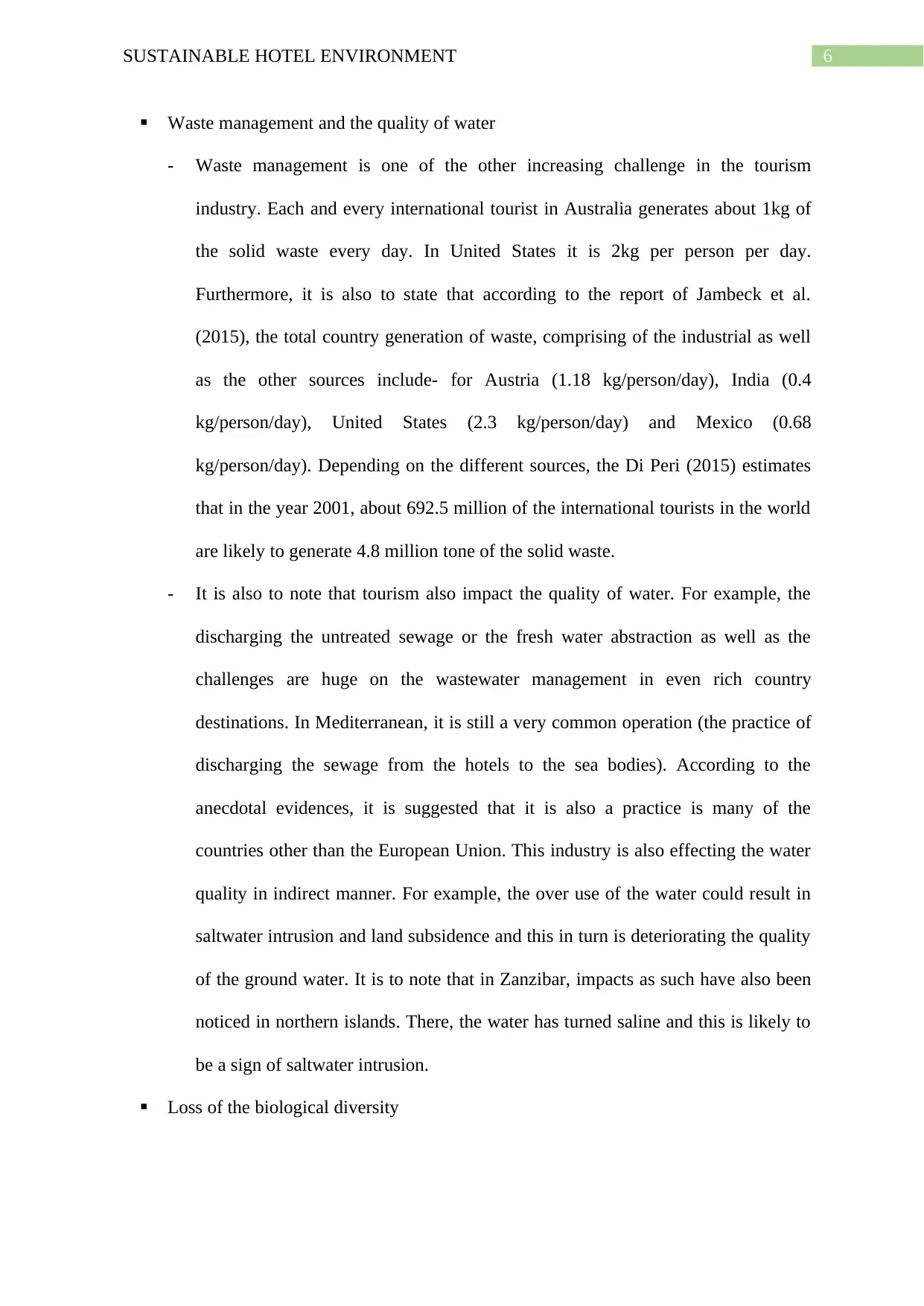
6SUSTAINABLE HOTEL ENVIRONMENT
Waste management and the quality of water
- Waste management is one of the other increasing challenge in the tourism
industry. Each and every international tourist in Australia generates about 1kg of
the solid waste every day. In United States it is 2kg per person per day.
Furthermore, it is also to state that according to the report of Jambeck et al.
(2015), the total country generation of waste, comprising of the industrial as well
as the other sources include- for Austria (1.18 kg/person/day), India (0.4
kg/person/day), United States (2.3 kg/person/day) and Mexico (0.68
kg/person/day). Depending on the different sources, the Di Peri (2015) estimates
that in the year 2001, about 692.5 million of the international tourists in the world
are likely to generate 4.8 million tone of the solid waste.
- It is also to note that tourism also impact the quality of water. For example, the
discharging the untreated sewage or the fresh water abstraction as well as the
challenges are huge on the wastewater management in even rich country
destinations. In Mediterranean, it is still a very common operation (the practice of
discharging the sewage from the hotels to the sea bodies). According to the
anecdotal evidences, it is suggested that it is also a practice is many of the
countries other than the European Union. This industry is also effecting the water
quality in indirect manner. For example, the over use of the water could result in
saltwater intrusion and land subsidence and this in turn is deteriorating the quality
of the ground water. It is to note that in Zanzibar, impacts as such have also been
noticed in northern islands. There, the water has turned saline and this is likely to
be a sign of saltwater intrusion.
Loss of the biological diversity
Waste management and the quality of water
- Waste management is one of the other increasing challenge in the tourism
industry. Each and every international tourist in Australia generates about 1kg of
the solid waste every day. In United States it is 2kg per person per day.
Furthermore, it is also to state that according to the report of Jambeck et al.
(2015), the total country generation of waste, comprising of the industrial as well
as the other sources include- for Austria (1.18 kg/person/day), India (0.4
kg/person/day), United States (2.3 kg/person/day) and Mexico (0.68
kg/person/day). Depending on the different sources, the Di Peri (2015) estimates
that in the year 2001, about 692.5 million of the international tourists in the world
are likely to generate 4.8 million tone of the solid waste.
- It is also to note that tourism also impact the quality of water. For example, the
discharging the untreated sewage or the fresh water abstraction as well as the
challenges are huge on the wastewater management in even rich country
destinations. In Mediterranean, it is still a very common operation (the practice of
discharging the sewage from the hotels to the sea bodies). According to the
anecdotal evidences, it is suggested that it is also a practice is many of the
countries other than the European Union. This industry is also effecting the water
quality in indirect manner. For example, the over use of the water could result in
saltwater intrusion and land subsidence and this in turn is deteriorating the quality
of the ground water. It is to note that in Zanzibar, impacts as such have also been
noticed in northern islands. There, the water has turned saline and this is likely to
be a sign of saltwater intrusion.
Loss of the biological diversity
Paraphrase This Document
Need a fresh take? Get an instant paraphrase of this document with our AI Paraphraser
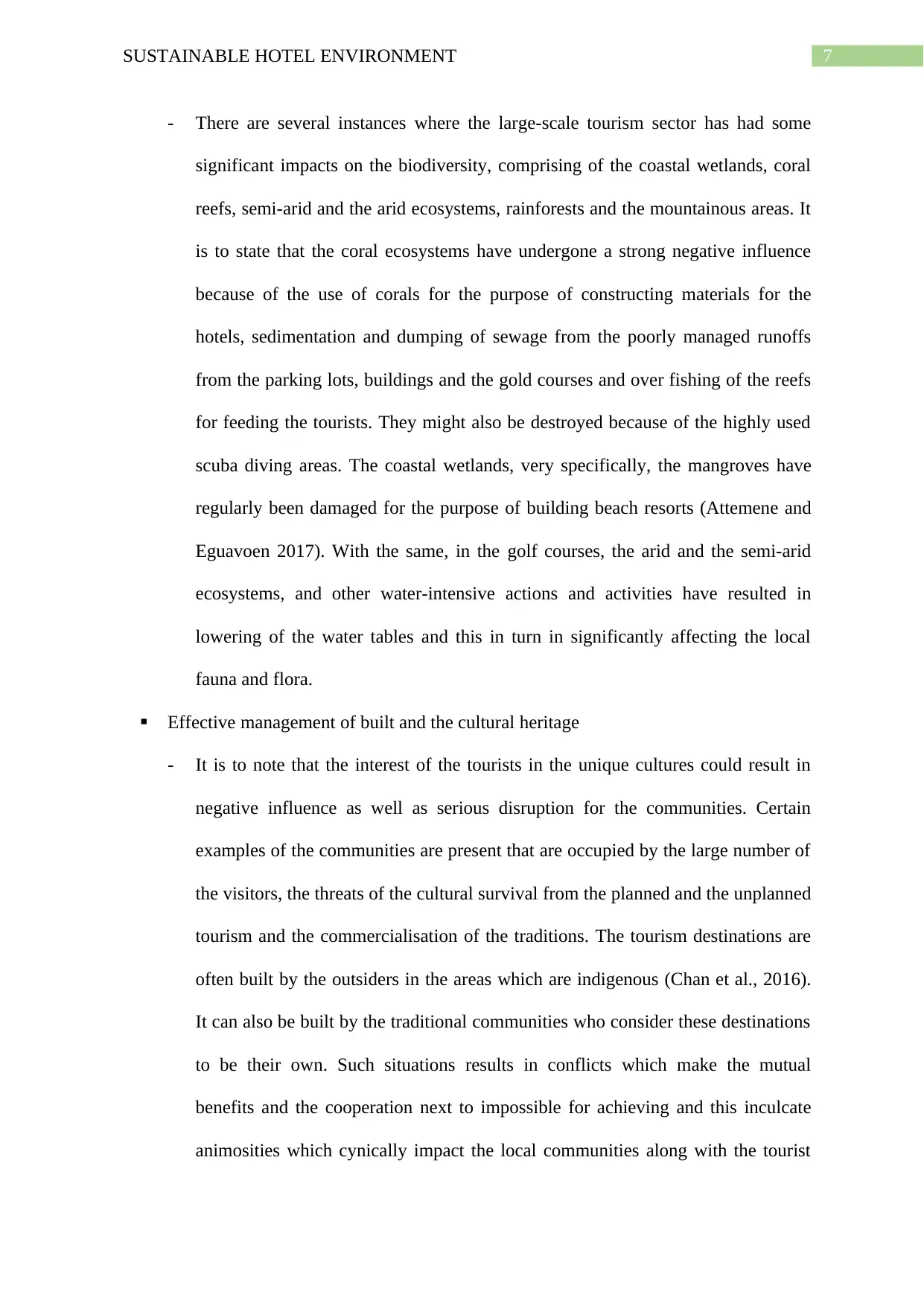
7SUSTAINABLE HOTEL ENVIRONMENT
- There are several instances where the large-scale tourism sector has had some
significant impacts on the biodiversity, comprising of the coastal wetlands, coral
reefs, semi-arid and the arid ecosystems, rainforests and the mountainous areas. It
is to state that the coral ecosystems have undergone a strong negative influence
because of the use of corals for the purpose of constructing materials for the
hotels, sedimentation and dumping of sewage from the poorly managed runoffs
from the parking lots, buildings and the gold courses and over fishing of the reefs
for feeding the tourists. They might also be destroyed because of the highly used
scuba diving areas. The coastal wetlands, very specifically, the mangroves have
regularly been damaged for the purpose of building beach resorts (Attemene and
Eguavoen 2017). With the same, in the golf courses, the arid and the semi-arid
ecosystems, and other water-intensive actions and activities have resulted in
lowering of the water tables and this in turn in significantly affecting the local
fauna and flora.
Effective management of built and the cultural heritage
- It is to note that the interest of the tourists in the unique cultures could result in
negative influence as well as serious disruption for the communities. Certain
examples of the communities are present that are occupied by the large number of
the visitors, the threats of the cultural survival from the planned and the unplanned
tourism and the commercialisation of the traditions. The tourism destinations are
often built by the outsiders in the areas which are indigenous (Chan et al., 2016).
It can also be built by the traditional communities who consider these destinations
to be their own. Such situations results in conflicts which make the mutual
benefits and the cooperation next to impossible for achieving and this inculcate
animosities which cynically impact the local communities along with the tourist
- There are several instances where the large-scale tourism sector has had some
significant impacts on the biodiversity, comprising of the coastal wetlands, coral
reefs, semi-arid and the arid ecosystems, rainforests and the mountainous areas. It
is to state that the coral ecosystems have undergone a strong negative influence
because of the use of corals for the purpose of constructing materials for the
hotels, sedimentation and dumping of sewage from the poorly managed runoffs
from the parking lots, buildings and the gold courses and over fishing of the reefs
for feeding the tourists. They might also be destroyed because of the highly used
scuba diving areas. The coastal wetlands, very specifically, the mangroves have
regularly been damaged for the purpose of building beach resorts (Attemene and
Eguavoen 2017). With the same, in the golf courses, the arid and the semi-arid
ecosystems, and other water-intensive actions and activities have resulted in
lowering of the water tables and this in turn in significantly affecting the local
fauna and flora.
Effective management of built and the cultural heritage
- It is to note that the interest of the tourists in the unique cultures could result in
negative influence as well as serious disruption for the communities. Certain
examples of the communities are present that are occupied by the large number of
the visitors, the threats of the cultural survival from the planned and the unplanned
tourism and the commercialisation of the traditions. The tourism destinations are
often built by the outsiders in the areas which are indigenous (Chan et al., 2016).
It can also be built by the traditional communities who consider these destinations
to be their own. Such situations results in conflicts which make the mutual
benefits and the cooperation next to impossible for achieving and this inculcate
animosities which cynically impact the local communities along with the tourist
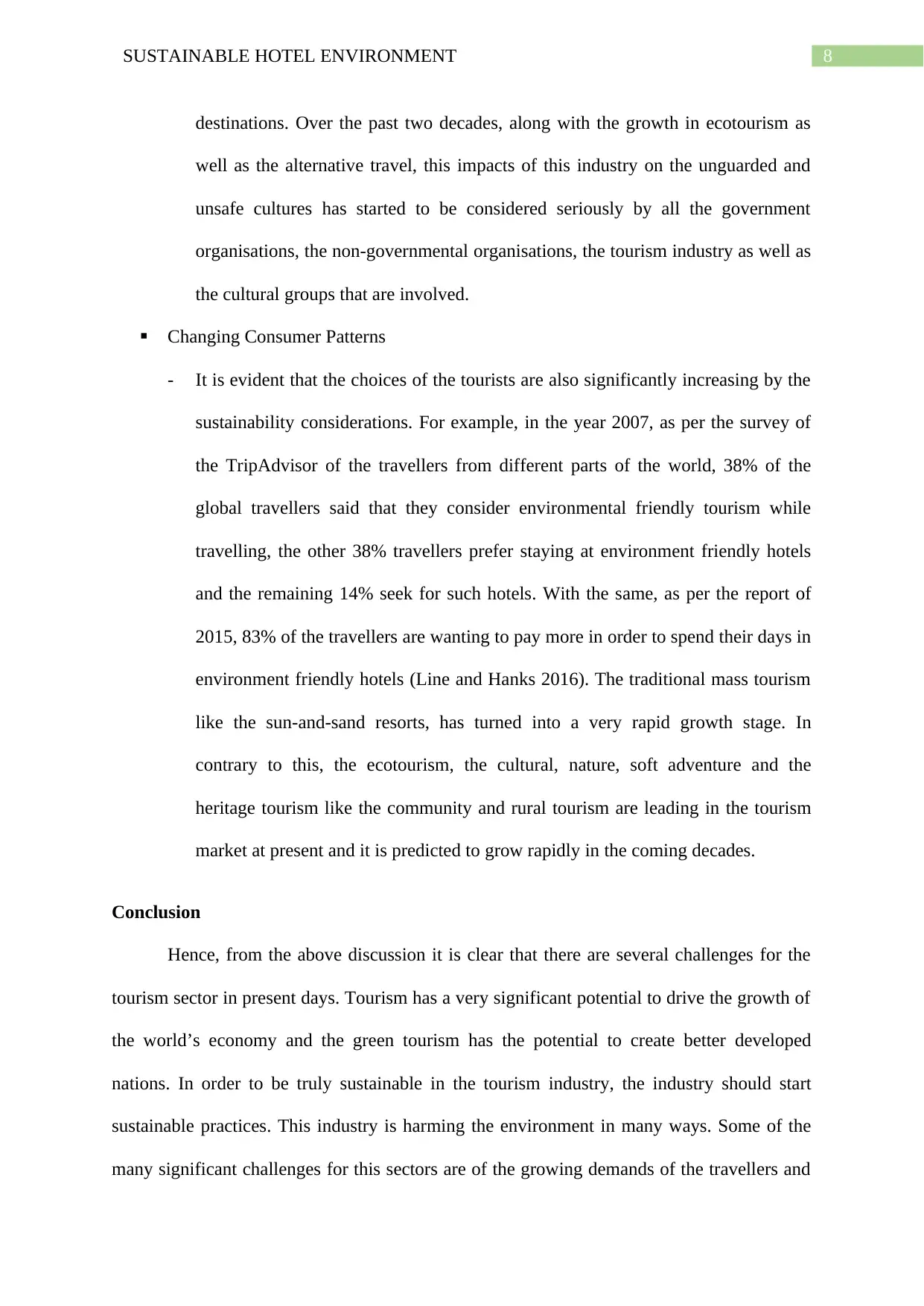
8SUSTAINABLE HOTEL ENVIRONMENT
destinations. Over the past two decades, along with the growth in ecotourism as
well as the alternative travel, this impacts of this industry on the unguarded and
unsafe cultures has started to be considered seriously by all the government
organisations, the non-governmental organisations, the tourism industry as well as
the cultural groups that are involved.
Changing Consumer Patterns
- It is evident that the choices of the tourists are also significantly increasing by the
sustainability considerations. For example, in the year 2007, as per the survey of
the TripAdvisor of the travellers from different parts of the world, 38% of the
global travellers said that they consider environmental friendly tourism while
travelling, the other 38% travellers prefer staying at environment friendly hotels
and the remaining 14% seek for such hotels. With the same, as per the report of
2015, 83% of the travellers are wanting to pay more in order to spend their days in
environment friendly hotels (Line and Hanks 2016). The traditional mass tourism
like the sun-and-sand resorts, has turned into a very rapid growth stage. In
contrary to this, the ecotourism, the cultural, nature, soft adventure and the
heritage tourism like the community and rural tourism are leading in the tourism
market at present and it is predicted to grow rapidly in the coming decades.
Conclusion
Hence, from the above discussion it is clear that there are several challenges for the
tourism sector in present days. Tourism has a very significant potential to drive the growth of
the world’s economy and the green tourism has the potential to create better developed
nations. In order to be truly sustainable in the tourism industry, the industry should start
sustainable practices. This industry is harming the environment in many ways. Some of the
many significant challenges for this sectors are of the growing demands of the travellers and
destinations. Over the past two decades, along with the growth in ecotourism as
well as the alternative travel, this impacts of this industry on the unguarded and
unsafe cultures has started to be considered seriously by all the government
organisations, the non-governmental organisations, the tourism industry as well as
the cultural groups that are involved.
Changing Consumer Patterns
- It is evident that the choices of the tourists are also significantly increasing by the
sustainability considerations. For example, in the year 2007, as per the survey of
the TripAdvisor of the travellers from different parts of the world, 38% of the
global travellers said that they consider environmental friendly tourism while
travelling, the other 38% travellers prefer staying at environment friendly hotels
and the remaining 14% seek for such hotels. With the same, as per the report of
2015, 83% of the travellers are wanting to pay more in order to spend their days in
environment friendly hotels (Line and Hanks 2016). The traditional mass tourism
like the sun-and-sand resorts, has turned into a very rapid growth stage. In
contrary to this, the ecotourism, the cultural, nature, soft adventure and the
heritage tourism like the community and rural tourism are leading in the tourism
market at present and it is predicted to grow rapidly in the coming decades.
Conclusion
Hence, from the above discussion it is clear that there are several challenges for the
tourism sector in present days. Tourism has a very significant potential to drive the growth of
the world’s economy and the green tourism has the potential to create better developed
nations. In order to be truly sustainable in the tourism industry, the industry should start
sustainable practices. This industry is harming the environment in many ways. Some of the
many significant challenges for this sectors are of the growing demands of the travellers and
⊘ This is a preview!⊘
Do you want full access?
Subscribe today to unlock all pages.

Trusted by 1+ million students worldwide
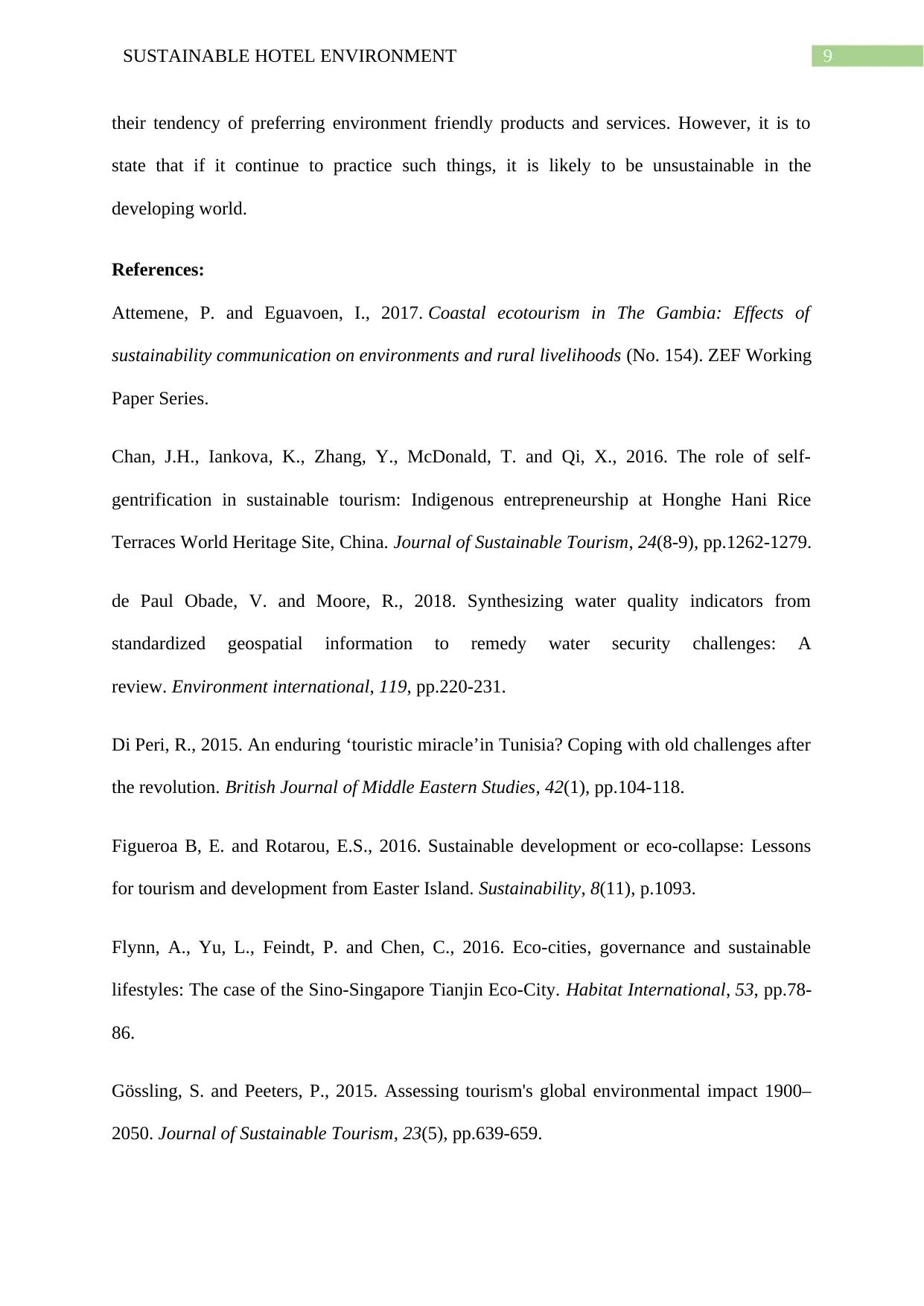
9SUSTAINABLE HOTEL ENVIRONMENT
their tendency of preferring environment friendly products and services. However, it is to
state that if it continue to practice such things, it is likely to be unsustainable in the
developing world.
References:
Attemene, P. and Eguavoen, I., 2017. Coastal ecotourism in The Gambia: Effects of
sustainability communication on environments and rural livelihoods (No. 154). ZEF Working
Paper Series.
Chan, J.H., Iankova, K., Zhang, Y., McDonald, T. and Qi, X., 2016. The role of self-
gentrification in sustainable tourism: Indigenous entrepreneurship at Honghe Hani Rice
Terraces World Heritage Site, China. Journal of Sustainable Tourism, 24(8-9), pp.1262-1279.
de Paul Obade, V. and Moore, R., 2018. Synthesizing water quality indicators from
standardized geospatial information to remedy water security challenges: A
review. Environment international, 119, pp.220-231.
Di Peri, R., 2015. An enduring ‘touristic miracle’in Tunisia? Coping with old challenges after
the revolution. British Journal of Middle Eastern Studies, 42(1), pp.104-118.
Figueroa B, E. and Rotarou, E.S., 2016. Sustainable development or eco-collapse: Lessons
for tourism and development from Easter Island. Sustainability, 8(11), p.1093.
Flynn, A., Yu, L., Feindt, P. and Chen, C., 2016. Eco-cities, governance and sustainable
lifestyles: The case of the Sino-Singapore Tianjin Eco-City. Habitat International, 53, pp.78-
86.
Gössling, S. and Peeters, P., 2015. Assessing tourism's global environmental impact 1900–
2050. Journal of Sustainable Tourism, 23(5), pp.639-659.
their tendency of preferring environment friendly products and services. However, it is to
state that if it continue to practice such things, it is likely to be unsustainable in the
developing world.
References:
Attemene, P. and Eguavoen, I., 2017. Coastal ecotourism in The Gambia: Effects of
sustainability communication on environments and rural livelihoods (No. 154). ZEF Working
Paper Series.
Chan, J.H., Iankova, K., Zhang, Y., McDonald, T. and Qi, X., 2016. The role of self-
gentrification in sustainable tourism: Indigenous entrepreneurship at Honghe Hani Rice
Terraces World Heritage Site, China. Journal of Sustainable Tourism, 24(8-9), pp.1262-1279.
de Paul Obade, V. and Moore, R., 2018. Synthesizing water quality indicators from
standardized geospatial information to remedy water security challenges: A
review. Environment international, 119, pp.220-231.
Di Peri, R., 2015. An enduring ‘touristic miracle’in Tunisia? Coping with old challenges after
the revolution. British Journal of Middle Eastern Studies, 42(1), pp.104-118.
Figueroa B, E. and Rotarou, E.S., 2016. Sustainable development or eco-collapse: Lessons
for tourism and development from Easter Island. Sustainability, 8(11), p.1093.
Flynn, A., Yu, L., Feindt, P. and Chen, C., 2016. Eco-cities, governance and sustainable
lifestyles: The case of the Sino-Singapore Tianjin Eco-City. Habitat International, 53, pp.78-
86.
Gössling, S. and Peeters, P., 2015. Assessing tourism's global environmental impact 1900–
2050. Journal of Sustainable Tourism, 23(5), pp.639-659.
Paraphrase This Document
Need a fresh take? Get an instant paraphrase of this document with our AI Paraphraser
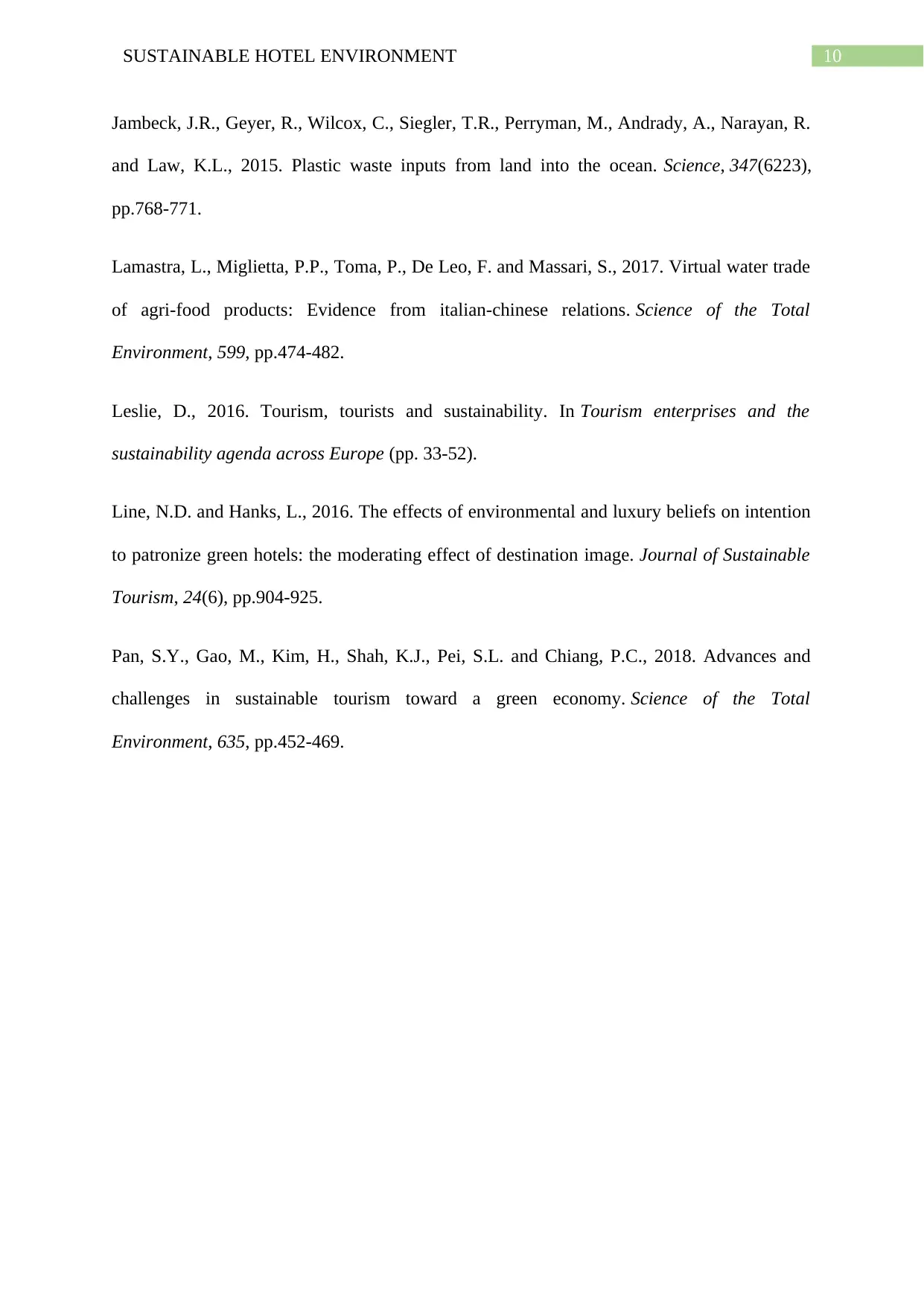
10SUSTAINABLE HOTEL ENVIRONMENT
Jambeck, J.R., Geyer, R., Wilcox, C., Siegler, T.R., Perryman, M., Andrady, A., Narayan, R.
and Law, K.L., 2015. Plastic waste inputs from land into the ocean. Science, 347(6223),
pp.768-771.
Lamastra, L., Miglietta, P.P., Toma, P., De Leo, F. and Massari, S., 2017. Virtual water trade
of agri-food products: Evidence from italian-chinese relations. Science of the Total
Environment, 599, pp.474-482.
Leslie, D., 2016. Tourism, tourists and sustainability. In Tourism enterprises and the
sustainability agenda across Europe (pp. 33-52).
Line, N.D. and Hanks, L., 2016. The effects of environmental and luxury beliefs on intention
to patronize green hotels: the moderating effect of destination image. Journal of Sustainable
Tourism, 24(6), pp.904-925.
Pan, S.Y., Gao, M., Kim, H., Shah, K.J., Pei, S.L. and Chiang, P.C., 2018. Advances and
challenges in sustainable tourism toward a green economy. Science of the Total
Environment, 635, pp.452-469.
Jambeck, J.R., Geyer, R., Wilcox, C., Siegler, T.R., Perryman, M., Andrady, A., Narayan, R.
and Law, K.L., 2015. Plastic waste inputs from land into the ocean. Science, 347(6223),
pp.768-771.
Lamastra, L., Miglietta, P.P., Toma, P., De Leo, F. and Massari, S., 2017. Virtual water trade
of agri-food products: Evidence from italian-chinese relations. Science of the Total
Environment, 599, pp.474-482.
Leslie, D., 2016. Tourism, tourists and sustainability. In Tourism enterprises and the
sustainability agenda across Europe (pp. 33-52).
Line, N.D. and Hanks, L., 2016. The effects of environmental and luxury beliefs on intention
to patronize green hotels: the moderating effect of destination image. Journal of Sustainable
Tourism, 24(6), pp.904-925.
Pan, S.Y., Gao, M., Kim, H., Shah, K.J., Pei, S.L. and Chiang, P.C., 2018. Advances and
challenges in sustainable tourism toward a green economy. Science of the Total
Environment, 635, pp.452-469.
1 out of 11
Related Documents
Your All-in-One AI-Powered Toolkit for Academic Success.
+13062052269
info@desklib.com
Available 24*7 on WhatsApp / Email
![[object Object]](/_next/static/media/star-bottom.7253800d.svg)
Unlock your academic potential
Copyright © 2020–2025 A2Z Services. All Rights Reserved. Developed and managed by ZUCOL.





